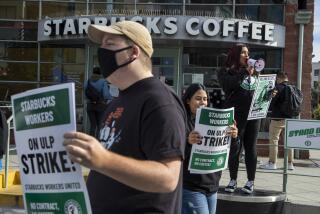Op-Ed: What Ketanji Brown Jackson can expect to eat for lunch if she’s confirmed

If Ketanji Brown Jackson is confirmed to the Supreme Court, she’ll instantly become one of the most powerful people in the country. And if there’s one thing I’ve observed from peeking down the corridors of influence over the years, it’s that with great power comes great lunches.
Or so I believed until I heard Conan O’Brien interview Justice Sonia Sotomayor on his podcast. In a discussion about working on the court, she nonchalantly said, “I bring my lunch every day. A number of the justices bring lunches from home. And some justices buy lunches at the courthouse cafeteria.”
Bring lunches from home? Why are they doing that? It’s not as if the president is waking up 20 minutes early to spread mustard on his bologna sandwiches. Jeff Bezos isn’t making an extra serving of pasta at night so he can slap a Post-it with his name on it and shove it in the Amazon fridge.
Allowing the most powerful legal minds in America to waste their mornings futzing with Tupperware containers is not a good use of their time. If we simply had a Supreme Court chef, the justices could get so much more done. Gay marriage would have been legal by 1985.
To figure out what’s going on while there’s still time to warn Jackson, I called Clare Cushman, the Supreme Court Historical Society’s director of publications and author of “Table for 9: Supreme Court Food Traditions & Recipes.”
Cushman confirmed the horror. She said that Sotomayor brings in a salad or sandwich she makes at home. Justice Samuel A. Alito Jr. packs his lunch too. So did Justice Anthony M. Kennedy before he retired. Justice John Paul Stevens’ wife sent him to work with cheese sandwiches on white bread with the crusts cut off. This would be a lame thing to eat before social studies class, much less before deciding if women can get abortions.
The court’s lunch problem has been going for a long time. Justice Louis Brandeis regularly brought a sandwich made of raw spinach on whole wheat. Chief Justice Charles Evan Hughes literally brought a brown bag, and Oliver Wendell Holmes brought his in the ammunition box he used during the Civil War, the only foodstuff conveyor that projects insecurity more than a New Yorker tote bag.
Do the justices have to sew their own robes too? Sand their own gavels?
“It’s so humble compared to the presidency,” Cushman said. She’s right. It’s also so humble compared to being a human.
It gets weirder. Justice David Souter ate plain yogurt with nothing in it. Every day. Often followed by an afternoon apple that he consumed in its entirety, including seeds, stem and core. When Cushman asked Souter to confirm this, he responded with a letter. “My customary (nearly invariable) lunch at the court (alone or with others) was plain nonfat yogurt. Justice Scalia (nearly invariably) described it as ‘disgusting,’” he wrote. Even the most die-hard liberals wouldn’t dissent from Scalia on that one.
These days, most of the judges who don’t make their own food get their lunch at the Supreme Court cafeteria. Some years ago the Washington Post reviewed it and gave it a failing grade, saying: “This food should be unconstitutional.”
“What you have to understand is that most judges seem to be all brain and no stomach. Judges in general are not foodies,” Cushman said. “It’s cultural. It is not cool to be a glutton or be picky about food. It’s all about being a brainiac.”
When Justice Benjamin Cardozo started taking a slice of cake with the lunch he brought to work, he got teased for being a glutton and stopped bringing it.
This tradition of austerity goes back to when the justices didn’t even get a break and had to sneak out in the hall or behind their desk to eat. Even after 1970, when Chief Justice Warren Burger expanded lunch from 30 minutes to an hour, they didn’t have much time for a decent meal. Now, on days when they hear cases or deliberate, the justices eat together in the Supreme Court dining room, where they do not talk about cases or politics.
“They could have a nice lunch brought up to them on silver. They could be like the president if they wanted to. But mostly they order off the cafeteria list,” Cushman said before upending my understanding of the world. “Also, they pay for it themselves.”
I definitely needed to warn Ketanji Brown Jackson about this.
The more I thought about these brainiacs eating their same weirdo lunches every day, the more I doubted it was because geniuses don’t care about food. There’s no way that when Chief Justice John G. Roberts Jr. was a partner at Hogan & Hartson he dunked saltines into his cafeteria soup like he does now. Justice Ruth Bader Ginsburg’s husband was an excellent cook, and Sotomayor has her staff find her new D.C. restaurants. And as we all know, Justice Brett M. Kavanaugh feels passionately about beer.
We adapt to our work culture, and the Supreme Court projects sober, moderate, public service. Which is why no kid says, “When I grow up, I want to be a Supreme Court justice.”
Bad lunches aren’t even the worst of the Supreme Court food culture that Jackson is going to have to deal with. It turns out the newest justice on the court has to sit on the cafeteria committee. “It’s like hazing,” Cushman explained. “Though Elena Kagan put in the new frozen yogurt machine and it made her a lot of friends.”
My advice to Jackson is to take over the committee and hire a damn chef already.
Joel Stein is the author of “In Defense of Elitism: Why I’m Better Than You and You’re Better Than Someone Who Didn’t Buy This Book.”
More to Read
A cure for the common opinion
Get thought-provoking perspectives with our weekly newsletter.
You may occasionally receive promotional content from the Los Angeles Times.










